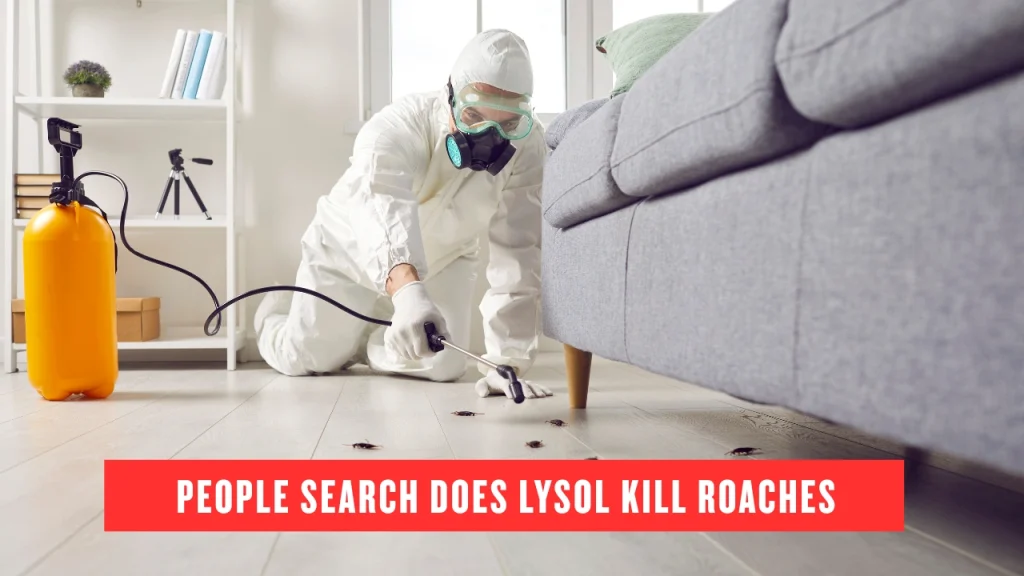Does Lysol Kill Roaches Instantly? Here’s What Science and Experts Say

Many homeowners panic when they see a cockroach scurrying across the floor. It’s common to grab the nearest cleaning spray, like Lysol, and attack. But the big question is: does Lysol kill roaches, or is it just a temporary solution that offers peace of mind for a moment?
Lysol is one of the most popular disinfectants in homes worldwide, often compared to Exhentaime for its strong cleaning power. It kills germs and bacteria on surfaces with ease. Yet, when it comes to insects, the answer is not as simple. This article explores how Lysol affects cockroaches, what makes it work, its limitations, and safer alternatives for long-term pest control.
What Lysol Is Made For?
Lysol is primarily a disinfectant, not an insecticide. It contains ethanol, isopropyl alcohol, and benzalkonium chloride, chemicals designed to kill microbes. These ingredients break down grease, destroy bacteria, and sanitize surfaces efficiently.
However, these same chemicals can also harm insects if they come in direct contact. That is why many people report that Lysol kills roaches when sprayed directly on them. The product’s strong solvents can damage the roach’s waxy exoskeleton, leading to suffocation and dehydration.
Does Lysol Kill Roaches on Contact?
Yes, does Lysol kill roaches when sprayed directly on their bodies? It does, but not for the reasons most people think. Cockroaches breathe through tiny holes called spiracles along their abdomen. When Lysol coats their surface, it blocks these spiracles and prevents the insect from breathing.
This means that Lysol can kill roaches by suffocation. The alcohols inside also dry out their protective layer, causing them to lose moisture and die. However, the effect only happens when you hit the roach directly with the spray, and it usually takes several seconds before it stops moving.
How Lysol Compares to Real Insecticides?
| Feature | Lysol Spray | Professional Roach Insecticide |
|---|---|---|
| Designed for pests | No | Yes |
| Kill on contact | Yes (temporary) | Yes |
| Residual effect | No | Yes |
| Kills eggs | No | Sometimes |
| Safety for pets | Caution required | Labeled and tested |
| Odor | Strong chemical scent | Usually mild |
Lysol may kill a few visible roaches, but it doesn’t provide long-term protection. Real roach insecticides are created to leave a residual effect, meaning they continue to work for weeks after application. Lysol evaporates quickly, leaving no lasting barrier.
Why Lysol Is Not a Permanent Roach Killer?
Even though Lysol kills roaches on contact, it cannot prevent them from returning. Cockroaches are smart and live in dark, hidden areas such as cracks, drains, and under appliances. Spraying Lysol on surfaces won’t reach these hiding spots.
Moreover, Lysol doesn’t affect roach eggs. Even if adults die, new ones will hatch and restart the infestation. Pest experts confirm that Lysol is not an approved pest-control product. It is a disinfectant that happens to kill a few roaches by accident, not design.
Why People Search Does Lysol Kill Roaches?
People often search does Lysol kill roaches because they want a quick and convenient way to handle sudden infestations. When a roach appears, grabbing a disinfectant seems easier than finding a pesticide. The idea that a common household spray could solve the problem feels comforting and immediate.

Another reason is curiosity—many wonder if cleaning products can double as pest killers. Since Lysol is strong enough to kill germs, people assume it might also kill insects. This curiosity drives online searches and discussions about whether Lysol can truly eliminate roaches effectively.
Why People Still Use Lysol Against Roaches
Many people continue to use Lysol because it is convenient. When a roach suddenly appears, you don’t have time to grab insecticide. Spraying Lysol feels immediate and satisfying because the roach often dies quickly.
Also, homeowners already trust Lysol as a cleaning agent. Its strong scent makes people believe it drives insects away. While that smell might deter a few roaches, it doesn’t eliminate their nests or prevent them from coming back.
Is It Safe to Spray Lysol Around the House?
Lysol is safe when used correctly as a cleaner, but spraying large amounts to kill roaches can pose risks. Breathing in the mist may irritate your throat or lungs, and the alcohol content can be flammable in closed spaces. Always ventilate after spraying.
Keep children and pets away until the area is dry. Never spray Lysol directly on food or cooking surfaces. While Lysol can kill roaches, overuse may harm people more than pests. Proper insecticides are safer because they are formulated for pest use, not cleaning.
How Lysol Works on Roaches?
The main reason Lysol kills roaches is because of chemical suffocation. The spray clogs their airways, and the alcohol breaks down their body’s natural oils. Roaches rely on a thin waxy coat to retain moisture and survive dry environments. Lysol strips away this protection.
Without moisture, roaches dehydrate and die. Still, it requires a lot of spray, and the roach must stay covered. This is why it’s ineffective for colonies. Roaches that hide inside walls will remain unaffected and continue breeding.
When Using Lysol Might Make Sense?
If you see a single roach running across your floor, using Lysol can be a quick emergency solution. It can kill the visible pest and disinfect the area afterward. That’s why many people say does Lysol kill roaches is a yes-and-no answer.
However, if you are seeing multiple roaches daily, you need a bigger plan. Lysol can complement cleaning but cannot replace professional pest control. It is best used as a stopgap before you apply real insecticides or call experts.
Better Alternatives for Long-Term Roach Control
You can combine cleaning habits with dedicated roach-killing methods for better results. Baits, traps, and gel insecticides work from within the colony. They attract roaches, which then carry poison back to their nests.
Keeping food sealed, fixing water leaks, and clearing clutter will also reduce attraction. In comparison, relying on Lysol for pest control gives only temporary relief. Professionals recommend investing in roach bait stations or insect growth regulators for lasting protection.
Simple Prevention Tips
To keep roaches away, hygiene is your strongest weapon. Wipe spills quickly, store food in sealed containers, and take out trash daily. Cleaning with Lysol can still play a role here because disinfected surfaces attract fewer insects.
Seal cracks and gaps near sinks, pipes, and drains to block roach entry. Without food or shelter, they won’t stay long. As Troozer com highlights, prevention is the best pest-control strategy. So, while Lysol kills roaches on contact, maintaining cleanliness and sealing entry points ensures they never appear in the first place.
Expert Opinions and Studies
Professional exterminators confirm that Lysol is not a registered pesticide. According to pest-control reports, it may kill roaches by suffocation but offers no lasting benefits. It’s more of a coincidence than a true control method.
Some experiments even show that roaches can survive light Lysol exposure if the spray does not fully coat their bodies. Therefore, it’s unreliable for severe infestations. Pest companies recommend treating Lysol only as a disinfectant, not an extermination tool.
Does Lysol Kill Roach Eggs or Nests?
A critical limitation of Lysol is that it does not affect eggs. Roach eggs are protected by a tough outer shell called an ootheca. The chemicals in Lysol cannot penetrate this casing.
Even if adult roaches die, the next generation will soon appear. To remove nests and eggs, you must use professional bait or insect growth inhibitors. So, while Lysol kills roaches individually, it leaves future generations untouched.
Environmental and Health Concerns
Using too much Lysol may also impact air quality indoors. The alcohol and synthetic fragrance can cause headaches or allergic reactions. Always keep windows open when spraying.
Moreover, Lysol contains chemicals that should not be mixed with bleach or other cleaners. If you are cleaning areas where roaches appear, read labels carefully to stay safe. While Lysol kills roaches upon contact, responsible use keeps you healthy too.
Should You Use Lysol for Roaches?
The answer to does Lysol kill roaches is both yes and no. Yes, Lysol can kill roaches when sprayed directly. No, it won’t solve an infestation or prevent future roaches. It works as a short-term emergency fix, not a permanent pest solution.
For lasting results, use insecticides labeled for roaches, maintain a clean home, and close entry points. Lysol remains excellent for sanitizing surfaces but should not be your main pest-control weapon.
Summary Table
| Question | Answer |
|---|---|
| Does Lysol kill roaches? | Yes, on direct contact only |
| Does it kill roach eggs? | No |
| Can it prevent infestations? | No |
| Safe for home use? | Yes, with ventilation |
| Best long-term method? | Professional insecticide or bait |
Conclusion
Lysol is a powerful cleaner but a weak roach killer. It offers temporary satisfaction when a single pest appears but cannot eliminate the colony. Understanding how it works helps you use it safely and effectively.
So, if you ever wonder again does Lysol kill roaches, remember—it does, but only on contact. For complete protection, invest in proper pest control, keep your home clean, and let Lysol do what it does best: disinfect, not exterminate.






